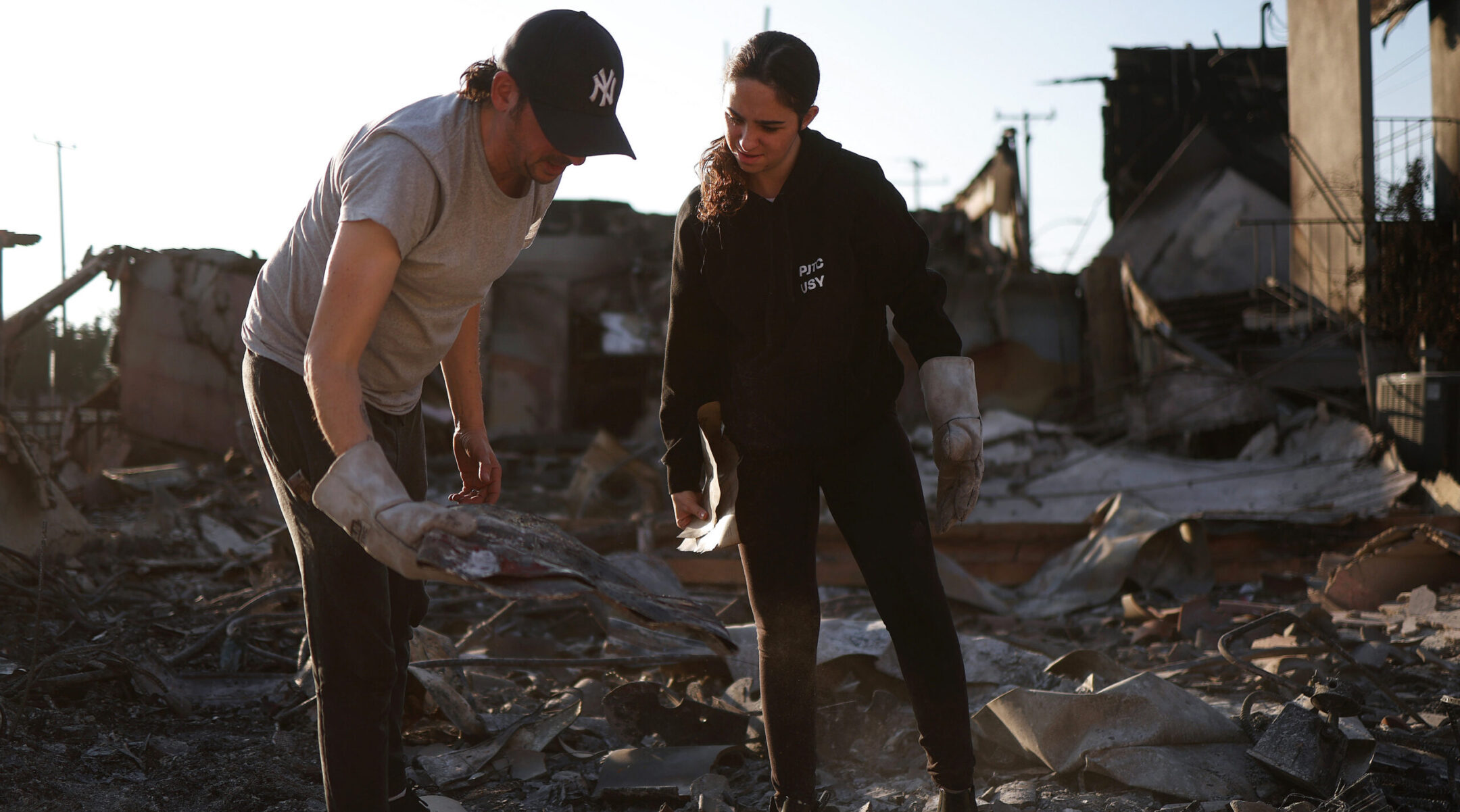Around the time Shane Langsam left their haredi Orthodox community in Brooklyn four years ago — shortly after a divorce and as they were beginning to trade dresses for pants and eat non-kosher food — they connected on Facebook with a kindred spirit, Jood Barnett.
Barnett had left a similar environment years earlier, and the two became a couple and moved in together. But they hid their relationship from their religious Jewish landlord, saying they were just friends, and kept up appearances to fit into the neighborhood — covering their windows on Shabbat to hide their use of electricity.
Things went well until the landlord’s wife entered the apartment to make a repair and saw that there was only one bed.
“They were nice to Jood. They would even invite us, to cook us our Shabbos meal, come for a holiday meal,” Langsam said. “But once they saw us as a couple, that was it.”
Soon after that, the landlord became hostile and sought to raise their rent by 15% — nearly double the city’s average rent increase this year. The landlord also refused to make repairs to the apartment and locked them out of the building’s laundry room, said the couple, who both use they/them pronouns.
The couple, who both work with special needs populations but were not employed at the time due to health issues, wanted to move but couldn’t afford a rent increase nor the cost of moving.
“When you leave, the community doesn’t support you and you don’t have the finances you need” for housing, Barnett said.
The couple’s problems with housing are typical of those who leave haredi communities, according to Naomi Moskowitz, director of economic empowerment at Footsteps, a New York nonprofit that helps its 2,400 members who have left haredi Orthodox Jewish communities.
In haredi communities, the norm is for people to live with their parents until marriage, or study in a residential yeshiva, then move in with their spouse — all the while relying on tight networks of family and communal support as well as, in some cases, public assistance.
Those who leave are often cut off from that social safety net, and find themselves searching for an affordable place to live in a city where housing is becoming scarcer and rents higher. Some of those who leave the community also lack secular education and job skills, compounding the challenges in creating a fresh start.
So Moskowitz is spearheading a new program to help Footsteps members acquire stable housing, which she said is a “key cornerstone” for those transitioning out of their communities.
“Somebody who already was sort of kicked out, for whatever reason, needs a job to be able to continue figuring out how to function and live in this world, but then it’s difficult to find a job if you don’t know where you’re sleeping, and it’s difficult to pay for rent,” Moskowitz said. “You get stuck in this loop.”
Support the New York Jewish Week
Our nonprofit newsroom depends on readers like you. Make a donation now to support independent Jewish journalism in New York.
Moskowitz said Footsteps members, and their living situations, do not fit any one single profile before they leave their communities. There are 19-year-olds looking to start college, parents who live with their children and need to stay in the vicinity of their schools, and 65-year-olds who are “starting a new part of their journey,” she said. Haredi communities in New York are diverse, both financially and in terms of religious and cultural practices, from traditionalist Hasidic movements to “Yeshivish” non-Hasidic communities.
There is likewise no established playbook for finding housing for new Footsteps members, she said. While some leave their community after years of planning, and have some money saved up for rent, others lean on a secular relative or end up drifting from couch to couch at acquaintances’ homes.
When Moskowitz left her Yeshivish community in 2013, she was a 28-year-old single mother of three who was struggling financially while working for nonprofits, without family support. She put herself through college and a master’s program, and started working for Footsteps in 2020 “to help people traveling similar paths that I have traveled,” she said.
The genesis for the housing idea came during the pandemic, when Moskowitz set up a crisis fund with money from donors and foundations. The fund was created to aid members facing a range of economic or mental health challenges. Four years in, though, around 80% of the more than $500,000 it distributed to around 300 recipients went to people with housing needs, including to Langsam and Barnett.
This isn’t Footsteps first housing initiative: Beginning in 2006, the organization rented a dorm room at the 92nd Street Y in Manhattan — which had on-site housing and other support for residents — to provide members a place to sleep during short transitions. But few Footsteps members used the program and the organization did not have the funding to keep it going long-term. The partnership ended a few years later.
Moskowitz acknowledged that housing is “sort of a big beast to tackle” — both because of its cost in New York and because the organization wants its members to be self-sufficient, something long-term rent assistance would work against. Previously, the group had focused on fields like career services, educational support and providing community.
But with $6 million in total contributions over the year ending in October 2023, and a staff of more than 30, Moskowitz said Footsteps felt like it was in a place where it could begin to bolster its housing programs.
The organization organized a list of New York City housing support programs, did interviews with other non-profits to learn about their offerings and successful programs, worked with consultants and surveyed members. At first, the staff discussed renting apartments for members to use, but members’ diverse housing needs made that unworkable.
Moskowitz added, “People getting to choose where they want to live is a big, big piece of somebody’s independence.”
The program is getting off the ground as New York renters struggle with a housing crunch due to a shortage of available apartments. A report from Douglas Elliman showed that the median rent in Brooklyn is $3,650, up from $2,800 at the end of 2021, a strain for New Yorkers earning the median salary in the city of around $76,000. The vacancy rate, or the percentage of rental units that are unoccupied, is around 1.4%, the lowest rate in decades. The average up-front cost to move into an apartment last year was $10,454, according to a study by the StreetEasy rental platform.
The high costs place pressure on haredi communities that are growing quickly due to large family sizes. Haredi families have long sought more affordable housing outside the city in locations such as New Jersey and Rockland County. Orthodox Jews, who do not drive on Shabbat, also prioritize living within walking distance of a synagogue, leading communities to congregate in the same neighborhoods.
Nishma Research, a group that surveys U.S. Orthodox Jews, said in a 2021 report that around one-third of haredi Jews reported that their home’s location had a “significant negative impact” on their household budget.
Support the New York Jewish Week
Our nonprofit newsroom depends on readers like you. Make a donation now to support independent Jewish journalism in New York.
Some haredi groups assist their community members with housing. The UJO of Williamsburg and North Brooklyn, based in the Satmar Hasidic community, assists area residents with applying for public housing benefits and other programs. The Crown Heights Central Jewish Community Council in the Chabad Hasidic community assists residents with renter’s rights advocacy and manages some apartments.
Other Jewish groups also provide housing support. The Met Council, a leading Jewish charity group, manages 1,200 housing units for low-income elderly people, both Jewish and non-Jewish. The Jewish Board, a social services group, provides housing support for New Yorkers living with mental illness.
“Rents in our area are getting out of control,” the Crown Heights Central Jewish Community Council advises on its website, adding that its apartments “are rented at affordable rates” and that people in a certain income range can apply.
But it cautions, “Apartments become available once in a while, and we have a waiting list of applicants.”
Footsteps also learned in its research phase that it wasn’t the only group helping with housing crises: The city has an array of housing support programs, though the system is difficult to navigate. So, in addition to the housing fund, Footsteps is looking to hire a full-time housing navigator to help members access existing support programs. In the meantime, it is referring members to groups such as Neighbors Together, a social services group in Brooklyn.
To date, the Footsteps’ housing program has distributed $80,000 to 51 members, Moskowitz said — an average of roughly $1,600 per person. The program does not pay members’ rent. Instead, it provides one-time stipends of $1,500 to $2,000 per individual for temporary needs such as a broker’s fee, moving costs or a security deposit. Members who have an apartment and are in a financial crunch due to a health crisis, for example, would also be able to apply for funding to help them get through the crisis.
“It’s not a large amount of money, but it’s enough to help somebody make that first step,” Moskowitz said. “So if somebody has a job and they’re ready, they know they can pay their rent, but they can’t come up with that big lump sum, the housing fund will help people make that jump.”
Alex Schwartz, a professor of urban policy at the New School who researches housing, said the initiative was similar to the “One Shot Deal” emergency cash assistance program from the city, which offers funding if people face challenges including nearly losing their housing or having their utilities shut off. But he said it is not a long-term solution.
“It may be a godsend for some people. Let’s say they have a job but they don’t have the savings to pay the brokerage fee,” Schwartz said of the Footsteps program, which he is not affiliated with. “It isn’t going to help if someone is unemployed or if it’s a mother with several young children and they don’t have the ability to work as well as pay for child care.”
He added, “It assumes they have the ability to generate the income necessary to afford rent and that’s a huge assumption.”
But Schwartz said the city’s housing crunch has been a chronic problem — “the need is just gigantic,” he said — and nonprofits that focus on it have long had a difficult time finding donors as they compete with other aid groups.
Moskowitz said there is not a specific goal for how much Footsteps plans to scale up the housing program, but she pointed to the organization’s educational scholarships program as an example. At first, the scholarships program distributed $15,000 to seven members, but grew as more members became aware of the program, and now grants around $500,000 per year.
Support the New York Jewish Week
Our nonprofit newsroom depends on readers like you. Make a donation now to support independent Jewish journalism in New York.
The program will benefit members like Barnett and Langsam as they seek stable accommodation. Barnett’s experience is a case study in the challenges Footsteps members face.
After leaving their community around 10 years ago, Barnett bounced between friends’ and relatives’ homes. They rented a room, but the roommate stole their deposit, leaving them homeless, they said. Barnett qualified for public housing for those with mental health issues due to their past diagnoses for depression and PTSD, and was placed in a public housing program with a roommate who suffered from delusions, sometimes shouting at their hallucinations.
Barnett ended up in a hospital, then a group home, where they said they were harassed by other residents. Eventually their family offered support after finding out about their living situation, and gave Barnett money for a security deposit, letting them get the apartment where Langsam later moved in at the end of 2022.
Moskowitz overheard the couple discussing their housing issues at a Footsteps event, and told them about the crisis fund. Barnett and Langsam applied for the funding, and each received a stipend, one for $1,500 to pay for a moving truck and another for $1,800 to cover most of a security deposit.
The couple, who recently published a book based on their life experiences, signed a lease on a first-floor apartment elsewhere in Brooklyn. When they moved in, their pet cat jumped to the apartment’s broad window to enjoy the view. They have a warm relationship with their landlord, sharing food with him that they prepare for the holidays. Their neighbors greet them when they take their cat outside for a walk in a stroller.
“We were able to start over from trauma, to healing and to living,” Langsam said. “It’s just a pleasure to be in an area [where] you feel wanted, and you’re there and you could just live.”
Jewish stories matter, and so does your support.









 English (US) ·
English (US) ·